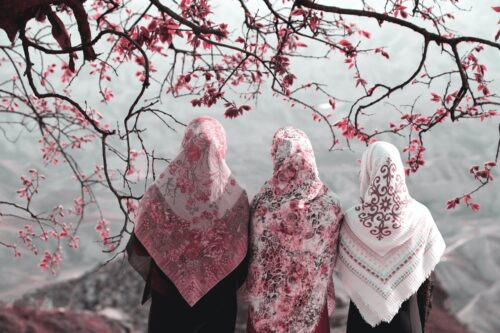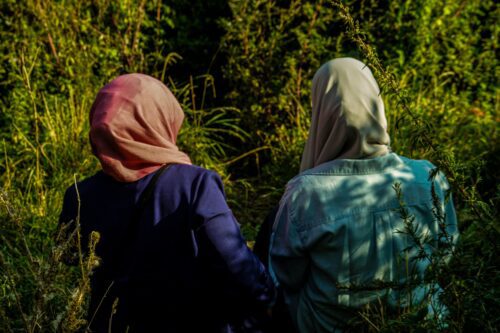No matter how modern and liberal the world gets, or which religion you follow, women will always need the protection of men. This is not because they are the weaker sex by any means, but because this world is a dangerous place, and woman, the most precious creation of Allah SWT, is vulnerable. She must be protected from those who lay an evil eye on her.
In Islam, the concept of Mahram is a person that you are not allowed to marry, a person with whom you have a pure relationship, and so you are permitted to meet them without a headscarf, travel with them, and can even shake their hands or hug them.
While the religious belief of mahram and non-mahram might seem like a barrier to most, it stems from the wisdom of Allah SWT to create a safe and sustainable community where values and relationships are respected. So, do you want to know who is your mahram? Keep on reading to find out!
Who Are Mahrams for Women?
 Mahram is derived from the Arabic word “Haraam,” which means something that is prohibited or sacred. According to Islamic law, mahram for a woman is someone she is not allowed to marry (unmarriageable kin) and is permitted to see them without a headscarf and hug them or shake their hands.
Mahram is derived from the Arabic word “Haraam,” which means something that is prohibited or sacred. According to Islamic law, mahram for a woman is someone she is not allowed to marry (unmarriageable kin) and is permitted to see them without a headscarf and hug them or shake their hands.
In Islam, Mahrams for women can be divided into three categories; mahram by marriage (sihriyya), mahram by blood (qarabah), and mahram by breastfeeding (radha’a).
It is stated in the famous Hanafi Fiqh treatise, al-Hidaya: “A Mahram (for a woman) is he, between whom and her marriage is permanently unlawful, whether this is due to the relationship of lineage/kin (nasab) or because of some other reason, such as foster relationship (radha’a) or relationship by marriage (musaharah).” (Al-Hidaya, Kitab al-Karahiyya, 4/461-462)
On the other hand, Imam al-Kasani (Allah have mercy on him) states: “A Mahram is he, with whom marriage is permanently unlawful, either by kinship, foster relationship or relationship by marriage.” (Bada’i al-Sana’i, 2/124)
Allah SWT regarding men who are mahram to women says in the Holy Quran, “And tell the believing women to reduce [some] of their vision and guard their private parts and not expose their adornment except that which [necessarily] appears thereof and to wrap [a portion of] their head covers over their chests and not expose their adornment except to their husbands, their fathers, their husbands’ fathers, their sons, their husbands’ sons, their brothers, their brothers’ sons, their sisters’ sons, their women, that which their right hands possess, or those male attendants having no physical desire or children who are not yet aware of the private aspects of women…” [Holy Quran, 24:31]
Likewise, Allah SWT regarding women who are mahram to men says, “And do not marry those [women] whom your fathers married, except what has already occurred. Indeed, it was an immorality and hateful [to Allah] and was evil as a way. Forbidden to you (for marriage) are your mothers, your daughters, your sisters, your father’s sisters, your mother’s sisters, your brother’s daughters, your sister’s daughters, your foster mothers who gave you suck, your foster milk suckling sisters, your wives’ mothers, your stepdaughters under your guardianship, born of your wives to whom you have gone in — but there is no sin on you if you have not gone in them (to marry their daughters), — the wives of your sons who (spring) from your own loins, and two sisters in wedlock at the same time, except for what has already passed; verily, Allah is Oft-Forgiving, Most Merciful.” [Holy Quran, An-Nisa’ 22-23]
Therefore, a mahram is someone with whom a woman is not lawfully allowed to tie the knot of marriage.
Who Is Non-Mahram for Women?
A non-mahram (also known as “Ghayr Mahram”) refers to a woman or man that a person is allowed to marry in their lifetime or someone who is temporarily forbidden for them, such as a husband’s brother or wife’s sister. Furthermore, if a man tries to marry a non-mahram woman, she will automatically become a mahram as she is his wife now.
Some general non-mahram relationships for women include:
- Brother-in-law
- Husband of your father’s sister
- Husband of your mother’s sister
- Your aunt’s husband
- Male cousins
Are Cousins Mahram?
Your cousins are the children of your aunts and uncles. They are not mahrams to one another because of which it is allowed to marry your cousins in Islam. Therefore, when meeting with cousins, a woman is expected to cover her head and keep a good distance, as shaking hands or hugging your cousins isn’t permissible in Islam.
List of Mahrams by Marriage
 When you enter the sacred relationship of marriage with someone, they automatically become your Mahram.
When you enter the sacred relationship of marriage with someone, they automatically become your Mahram.
Allah SWT in the Holy Quran says, “And (prohibited to you in marriage) are your wives’ mothers; your stepdaughters under your guardianship, born of your wives with whom you have had sexual intercourse. There is no prohibition if you have not cohabited.” [Holy Quran, Surah al-Nisa, 22]
‘Uqba b. Amir reported that the Messenger (PBUH) of Allah SWT said, “Beware of getting into the houses and meeting women (in seclusion).” A person from the Ansar said: “Allah’s Messenger (PBUH), what about the husband’s brother?” Whereupon he said: “The husband’s brother is like death.” (Muslim 26/5400)
The Almighty states, “And marry not women whom your fathers married – except what is past: It was shameful and odious.” [Holy Quran, Surah al-Nisa, 21]
Therefore, the list of mahrams by marriage includes:
- Wife/husband.
- Ancestors of your wife/husband (great-grandparents, grandparents, parents).
- Wife/husband of your descendants (daughter-in-law, son-in-law, wife or husband of your grandchildren).
- Wife/husband of your ancestors (father’s wife, mother’s husband, wife of grandfather, husband of grandmother).
- Descendants of your husband (stepdaughter, step-son).
Allah SWT in the Holy Quran says, “And (prohibited to you in marriage) are (those who have been) wives of your sons proceeding from your loins.” (ibid)
List of Mahrams by Blood
It is considered unlawful for a man to marry women who are related to him by blood (family/lineage). Allah SWT in Surah al-Noor says, “And not to reveal their adornment except to their husbands, or their fathers, or their husband’s fathers, or their sons, or their husband’s sons, or their brothers or their brother’s sons, or their sister’s sons…” [Holy Quran, al-Nur 24:31]
Listed below are those who are your mahrams by blood:
- Your ascendants (great grandparents, grandparents, parents).
- Your descendants (children, grandchildren, great-grandchildren).
- The first generation of your grandparents (father’s sisters and brothers including half-sisters and half-brothers, mother’s sisters and brothers including her half-sisters and half-brothers).
- The descendants of your parents (sisters, brothers, half-sister, half-brother, children of your sister, brother, half-sister, and half-brother).
- Maternal and paternal uncles.
“Or were you witnesses when death approached Ya‘qub (Jacob)? When he said unto his sons, ‘What will you worship after me?’ They said, ‘We shall worship your Ilah (God — Allah) the Ilah (God) of your fathers, Ibrahim (Abraham), Isma’il (Ishmael), Ishaq (Isaac)…’” [al-Baqarah 2:133]. Isma’il was the paternal uncle of the sons of Ya’qub.
(Tafsir al-Razi, 23/206; Tafsir al-Qurtubi, 12/232, 233; Tafsir al-Alusi, 18/143; Fath al-Bayan fi Maqasid al-Quran by Siddiq Hasan Khan, 6/352)
List of Mahrams By Breastfeeding
 A woman might have many mahrams through rada’ah. Allah SWT in the Holy Quran says, “And (prohibited to you in marriage are) your foster-mothers and foster-sisters.” [Holy Quran, Surah al-Nisa, 23]
A woman might have many mahrams through rada’ah. Allah SWT in the Holy Quran says, “And (prohibited to you in marriage are) your foster-mothers and foster-sisters.” [Holy Quran, Surah al-Nisa, 23]
Sayyiduna Abd Allah ibn Abbas (May Allah be pleased with him) narrates that the Messenger (PBUH) of Allah SWT said about Hamza’s (RA) daughter, “I am not legally permitted to marry her, as foster relations are treated like blood relations (in marital affairs). She is the daughter of my foster-brother.” (Sahih al-Bukhari, no. 2502)
This means that relationships that are unlawful through lineage and blood will also be unlawful for fosterage, such as foster-uncle and foster-brother. Furthermore, the woman who has breastfed the child will be considered a Mahram for them.
Allama Alusi says, “The relationship of Mahram by Radaa’ah (breastfeeding) is that of Mahram by blood; which indicates that it is never permitted to marry because of that relationship of Mahram.” (Tafsir Alusi 18/143)
While commenting on this verse (24:31), Imam Jassas said, “When Allah SWT mentioned the fathers and that their marriage to these women is forbidden forever; this denotes that the same prohibition applies to other relationships of Mahram, such as the mother of the woman and those who are Mahrams by Radaa’ah.” (Ahkam al-Quran by Jassas 3/317)
However, note that according to Imam Abu Hanifa and Imam Muhammad, this condition is only applicable if the child has been breastfed before the age of two and a half years. Here is the answer to who is your mahram by breastfeeding:
- All of your children.
- If you have been breastfed by 2.5 years of age by any woman, she is your mahram.
- All of the children who are breastfed by the same woman.
- Foster mother and her husband
- Foster brother and sister
Sayyida Aisha (RA) reports: “Once the Messenger (PBUH) of Allah SWT entered my house while a man was with me. He said: ‘O Aisha! Who is this?’ I replied: ‘My foster brother.’ He said: ‘O Aisha! Be careful in determining who your foster brother is, for suckling is only valid if it takes place in the suckling period.’” (Sahih al-Bukhari, no. 2504 & Sahih Muslim, no. 1455)
Therefore, one must be careful in determining who is a Mahram or non-Mahram through foster relations as it can be complicated. It is advised to consult a scholar for help.
Is My Husband’s Nephew My Mahram?
No, your husband’s nephew is not your mahram. Hence, it is strictly instructed that you wear a hijab around him. However, in the case that you have breastfed him (within the first two or two and a half years), then the rules of mahram by fosterage will be applied.
Summary – Who Is Your Mahram?
Islam is the religion of peace, and Allah SWT has perfected it in every way. Islam teaches us how to protect ourselves from falling into undesirable situations and sins. It tells us to have restrictions and safeguard ourselves, our relationships, and our community as a whole.
The purpose of mahram and non-mahram is to prevent Zina. These restrictions are meant to protect both men and women and achieve a sustainable community.
So, who is your mahram? Simply put, mahram is anyone you are not allowed to marry and can meet without Hijab. This permanent unlawfulness of marriage is established in three ways: relationship through marriage, relationship through blood (lineage), and relationship through fosterage.
Allah SWT has instructed women to cover their heads with a veil and maintain a healthy distance from everyone but their mahrams such that, when travelling to Saudi Arabia for Hajj or Umrah, it is compulsory for a woman to have a mahram by her side when going to perform the pilgrimage.
In case you have any questions about who is your mahram and who isn’t, we recommend talking to an Islamic scholar and clearing your doubts.
source : https://thepilgrim.co/who-is-your-mahram/
Post Disclaimer | Support Us
Support Us
The sailanmuslim.com web site entirely supported by individual donors and well wishers. If you regularly visit this site and wish to show your appreciation, or if you wish to see further development of sailanmuslim.com, please donate us
IMPORTANT : All content hosted on sailanmuslim.com is solely for non-commercial purposes and with the permission of original copyright holders. Any other use of the hosted content, such as for financial gain, requires express approval from the copyright owners.
 Sri lanka Muslims Web Portal Sri Lanka Muslims News Center
Sri lanka Muslims Web Portal Sri Lanka Muslims News Center
 Donate
Donate


